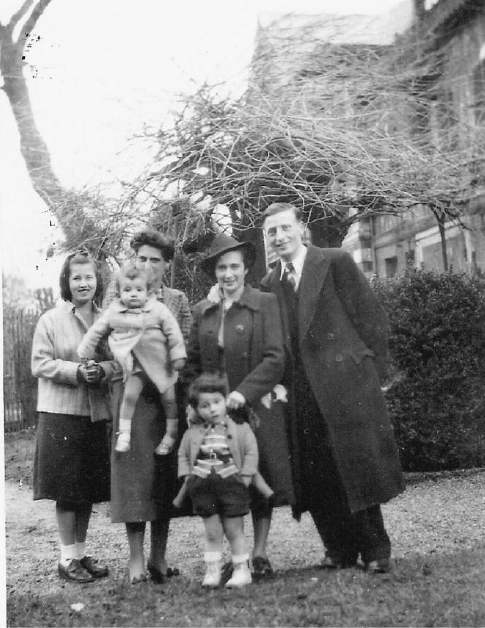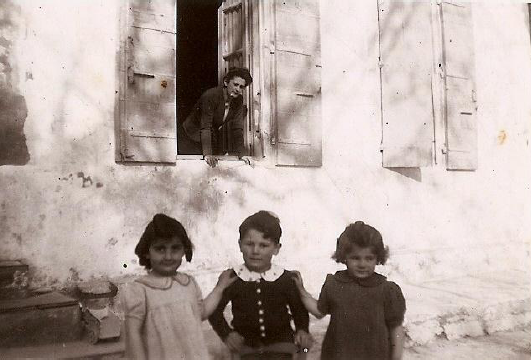Great Escapes
We had to leave Paris quickly. For us the obvious next move was to cross the demarcation line from occupied to free zone. The exact spot is not known but it was presumably due south of Paris (although my aunt whose memoirs I have just read, seemed to think that we crossed via the Basque Country, which surprises me somewhat…). Members of the Resistance volunteered to pass civilians across the line far away from the checkpoints and hopefully unnoticed by German soldiers. This is what happened on 8 December 1940. I well remember climbing into a horse-drawn cart in the dark of the moon, being covered with blankets and told not to say a word, cough or sneeze because we were not to be heard or seen. Everything went well and once in the Free Zone we were on our way to Moissac – in the Tarn et Garonne, south west France. There we were to join my family: Monique – whose twin girls (Myriam and Aline) were born a few days before, on the 5th December. By the way, my mother learnt that Mamé, always very pragmatic, had hidden on her body two ingots of gold, as the French say ‘au cas où’ or ‘just in case’! In Moissac we felt relatively safe surrounded by family and the dedicated Scouts Israëlites de France. Their leader Gamzon, with his fellow leaders, ran a very tight ship in the home for Jewish children where everyday life was based on Scout idealism. In fact there were already several homes but fortunately all were situated in the Free Zone. (…)
We stayed in Moissac for a few weeks, enough time for my mother to gather her thoughts. This would not be the end of journey as we had to get out of the country at all costs. It was decided that it would be easier for us to be nearer Marseille as Ninou had to put her papers in order. On marrying my father, she had adopted British nationality, had two passports, both expired… and as our journey promised to be long through Spain and Portugal (then the only way out of France) visas were also needed.
Early in 1941, we made our way to the south east Mediterranean coast. Some rooms had been reserved at fisherman’s cottage in Cassis- an ancient fishing port, rebuilt 200 years ago on old ruins dating back to the 16thcentury (this information would have seemed rather irrelevant to our problem!). The house we lived in faced the old port-which is today most certainly taken over by luxury yachts. Marseille was only 22 kilometres away and a short journey by train. The American Consulate would provide us with enough funds for the next stage of our escape out of France. Ninou rarely talked about this long and arduous journey and later as adolescents we did not many questions as our minds were focusing on more important matters (at least for us!). Of course we now regret not having quizzed her more about that period in our lives. (…)
By the 2nd May 1941 (Doreen’s 17th birthday) our papers were ready and having said goodbye to Mamé (it must have been an emotional moment as no-one knew how long the war would last and we might not see each other again) we left France by train, crossing the frontier at Cerbère and entering Spain at Port-Bou. Many civilians escaped from France into Spain walking at night in the Pyrenees mountains, crossing areas of unguarded frontiers. They were risking a great deal. Some were shot but many were lucky and managed to get through.
This time however we were doing things in style and travelling by train was rather less dangerous than passing under barbed wire on a cold December night, as we had done to pass the demarcation line! Spain was never involved against Germany nor was she considered as an ally. So that country was thought of as hostile by those engaged in the war against Hitler. In the train travelling towards Madrid, there must have been a great deal of checking of papers in carriages and corridors. Patrick has a vivid memory of that journey: a sad time for him, many tears were shed as it is then that he lost his beloved toy dog which he carried everywhere. A very traumatic event for a child at a particularly traumatic moment…
Portugal was a neutral country and helped the allies by allowing the Azores (a Portuguese colony) to be a base for aircraft. In the most westerly of European states one could probably say that Ninou now at last felt safer. We first stayed at La Pensao Lusitano in Padere near Lisbon. There were many refugees in the country as it was a point of departure for the Americas or Great Britain. People were waiting and waiting for planes and convoys of ships which would take them to safety – although sailing in the Atlantic was not the safest of ways of escaping! (…)
Then, the moment my mother had been waiting for, for so long, came at last. A convoy was due to arrive shortly in Gibraltar. On the 19th June 1941 (my fourth birthday) we boarded in Lisbon, the Avoceta, a passenger vessel built in Dundee in 1923 which normally operated the Liverpool, Casablanca, Lisbon, Canary Islands route – with passengers and fruit cargoes. (Just for the record, on the 25th September 1941, three months after we sailed on this ship it was sunk by a U boat, north of the Azores, taking the lives of 123 people. Survivors were rescued by MS Periwinkle and taken to Milford Haven). When we travelled to Gibraltar, many other refugees were on the Avoceta and the cabins must have been fully occupied, however we arrived safely two days later.
The convoy sailing towards Britain was to leave only on the 4th July – another 12 days to wait – but I do not know what happened to us then. Could we have stayed on ‘The Rock’ or on board ship? We were in fact expecting the delayed arrival of the Furious which was to head the convoy. I presume we did not know at the time that this Royal Navy ship had received some damage in an incident described in the following way: ‘During launch operation the second aircraft struck part of the ship’s (the Furious) structure and crashed overboard. The fuel tank caught fire causing 15 casualties, nine of which were fatal. Launch operation resumed when the fire was extinguished’. This happened on the 30th June, the day before it arrived in Gibraltar! (This information was obtained by Patrick on the Arnold Hague site). 1941 and the subsequent years of the war were busy times for the Navy: warships were crisscrossing the Mediterranean and the Atlantic, always on the move. Furious had to be repaired and needed to go back to the UK rather urgently… We were fortunate to be escorted not only by the Furious but also by the light cruiser Hermione and several destroyers Lance, Legion, Wishart and Fury. Six ships in total!! At the time it was the rule to have such an escort. The Atlantic waters were dangerous places to be sailing in.
We departed. The Scythia was carrying us three along with 2,000 other refugees. It had been a cruise ship and Patrick remembers well the surroundings: the plush carpets, the large tables with immaculately white table cloths and the incessant safety drills we had to go through – almost daily. We were well looked after by the sailors and there too I have a memory of sitting on a sailor’s knee. (What would Freud make of that?). On board, we were told of depth charges being launched by our escort ships at German U boats.
We arrived without incident on the 13th July in Glasgow. … We had spent nine days on the unsafe waters of the Atlantic, on our ‘cruise’, taking us to the Promised Land where we incidentally, were to stay another four years till August 1945. No-one knew at the time how long this war would last (the time span of a war is never known). In 1939 people really thought that the conflict would be of a short duration. Little did they know!
Read Colin Child’s blog about Dinah’s experience of searching out her family’s past here.
You can find a full account of Dinah Child’s escape attached. This account also contains details of the context of Dinah Child’s escape and the escapes of her {1} father, a British soldier, via St Nazaire; {2} half-sister, Doreen, from internment in Vittel to London where she worked for Anna Freud; {3} aunt and family in hiding with Eclaireurs Israelites [Jewish Scouts] and later in a camp in Switzerland.
Click here to download a copy: Dinah Child – Memoir
Comment on the story here.


